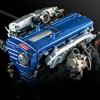Compression Ratios
Announcements
-
Similar Content
-
Latest Posts
-
Hi all, long time listener, first time caller i was wondering if anyone can help me identify a transistor on the climate control unit board that decided to fry itself I've circled it in the attached photo any help would be appreciated
-
I mean, I got two VASS engineers to refuse to cert my own coilovers stating those very laws. Appendix B makes it pretty clear what it considers 'Variable Suspension' to be. In my lived experience they can't certify something that isn't actually in the list as something that requires certification. In the VASS engineering checklist they have to complete (LS3/NCOP11) and sign on there is nothing there. All the references inside NCOP11 state that if it's variable by the driver that height needs to maintain 100mm while the car is in motion. It states the car is lowered lowering blocks and other types of things are acceptable. Dialling out a shock is about as 'user adjustable' as changing any other suspension component lol. I wanted to have it signed off to dissuade HWP and RWC testers to state the suspension is legal to avoid having this discussion with them. The real problem is that Police and RWC/Pink/Blue slip people will say it needs engineering, and the engineers will state it doesn't need engineering. It is hugely irritating when aforementioned people get all "i know the rules mate feck off" when they don't, and the actual engineers are pleasant as all hell and do know the rules. Cars failing RWC for things that aren't listed in the RWC requirements is another thing here entirely!
-
I don't. I mean, mine's not a GTR, but it is a 32 with a lot of GTR stuff on it. But regardless, I typically buy from local suppliers. Getting stuff from Japan is seldom worth the pain. Buying from RHDJapan usually ends up in the final total of your basket being about double what you thought it would be, after all the bullshit fees and such are added on.
-
The hydrocarbon component of E10 can be shittier, and is in fact, shittier, than that used in normal 91RON fuel. That's because the octane boost provided by the ethanol allows them to use stuff that doesn't make the grade without the help. The 1c/L saving typically available on E10 is going to be massively overridden by the increased consumption caused by the ethanol and the crappier HC (ie the HCs will be less dense, meaning that there will definitely be less energy per unit volume than for more dense HCs). That is one of the reasons why P98 will return better fuel consumption than 91 does, even with the ignition timing completely fixed. There is more energy per unit volume because the HCs used in 98 are higher density than in the lawnmower fuel.
-
No, I'd suggest that that is the checklist for pneumatic/hydraulic adjustable systems. I would say, based on my years of reading and complying with Australian Standards and similar regulations, that the narrow interpretation of Clause 3.2 b would be the preferred/expected/intended one, by the author, and those using the standard. Wishful thinking need not apply.
-






Recommended Posts
Create an account or sign in to comment
You need to be a member in order to leave a comment
Create an account
Sign up for a new account in our community. It's easy!
Register a new accountSign in
Already have an account? Sign in here.
Sign In Now